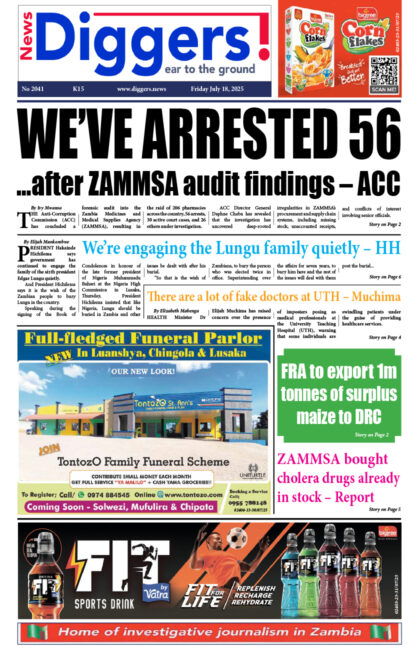Zambia and South Africa have formed a private sector working group to create a framework that will ensure the smooth flow of essential goods and services, during the COVID-19 lockdown of most Southern African Development Community (SADC) countries.
The working group will be chaired by deputy secretary to Cabinet, Christopher Mvunga.
And Finance Minister Dr Bwalya Ngandu has encouraged the Zambian private sector to rump-up participation in the value-chain and take advantage of the internal market platforms while maintaining quality standards, regular supply and stable prices to the greatest extent possible.
Speaking at the economic sustainability and emergence purpose meeting, Thursday, the two countries discussed the necessity of ensuring that South African Chain Stores operating in Zambia opened their doors wider to local producers and suppliers to ensure that there was business continuity and empowerment.
“Finance Minister Dr BWALYA NG’ANDU, who was also the convenor and Chairperson, said the Zambian Government has placed sustenance of the value chain and continued empowerment of local businesses at the centre of its economic sustainability and emergence purpose plans for the immediate term and the future. Dr NG’ANDU took the opportunity to encourage the Zambian private sector to rump-up participation in the value-chain and take advantage of the internal market platforms while maintaining quality standards, regular supply and stable prices to the greatest extent possible,” read the statement issued by Ministry of Finance spokesperson Chileshe Kandeta.
And South African High Commissioner George Nkosinati Twala said his office was ready to work with Zambian authorities to facilitate strengthened engagement between private sector players of the two countries and ensure that the value and supply chains were kept in motion.
At the same meeting, Livestock Minister Professor Nkandu Luo said her Ministry was in the process of conducting an inventory of livestock import-export permits, adding that COVID-19 had presented an opportunity for the country to adopt an evidence based approach in assessing the impact of fresh and processed cross-border consumer products on the health and well-being of citizens.
National Development Minister Alexander Chiteme called for the conclusive examining of rental charges in major shopping malls located in different parts of the country to ensure that Zambian businesses are accommodated on more affordable terms and conditions especially now that Covid-19 had impacted negatively.
Transport and Communications Minister Mutotwe Kafwaya assured the meeting that his Ministry had commenced engagement with the Ministry of Health and other stakeholders in the logistical-chain in order to develop guidelines and rules for cross-border transporters during the Covid-19 lockdown period in some SADC Countries.
Meanwhile, Business Council Emergency Task Force [BCET] Against Covid-19 Chairperson, Jason Kazilimani called for a stop to the speculative trading of the kwacha among other proposals for consideration by the government.
According to the statement, the Zambian Government team also held a meeting with the Business Council Emergency Task Force [BCET] Against Covid-19, at which the Chairperson, Jason Kazilimani, proposed some measures for consideration by the Government, such as: Prohibiting and curtailing speculative trading in the Kwacha; Promoting close engagement of the banking and financial services sector and Covid-19 affected borrowers to forestall business stagnation and closures; Facilitation of the importation of fuel and fertilizer by the private sector; Cutting all non-priority expenditure from the budget; and Examining the full impact of the employment code of 2019 on businesses during Covid-19.
Among the other key issues discussed was import substitution, mutual market access, supplier payment systems, banking and financial services, transport and logistics, smoothening of regulatory matters, border clearance and transit insurance, and the creation of the Zambia and South Africa working group on trade and economic facilitation during Covid-19 and beyond.



















